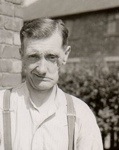 Genealogist Amy Johnson Crow, who blogs at No Story Too Small, has set a challenge to write about one ancestor each week. I’ve decided to take up that challenge to wake up my (somewhat) languishing blog, but to honor my ancestors. I plan to post every week on Sunday, and I encourage others to join the challenge with me.
Genealogist Amy Johnson Crow, who blogs at No Story Too Small, has set a challenge to write about one ancestor each week. I’ve decided to take up that challenge to wake up my (somewhat) languishing blog, but to honor my ancestors. I plan to post every week on Sunday, and I encourage others to join the challenge with me.
I’m out of town this week, so my story for week #4 will be brief. Francis William “Will” John Mason is my mother’s father. He was a first-generation Welshman, born in Abertillery, Wales, in 1892, in what was then the county of Monmouthshire (now Gwent). His parents came to Wales from the nearby English county of Wiltshire. They probably came because of the work available in the mines, and some time between the ages of 8 and 18, Will became a coal miner like his father.
When WW1 broke out, Will and his brother Albert joined the British Army in 1915. They both survived, but Will sustained serious injuries during the Battle of the Somme. This horrific battle in France claimed the lives of 1,000,000 men; 60,000 of them from the British Army.
My earliest memories of my grandfather were of his badly disfigured face, which was a result of being struck by a piece of shrapnel that tore through the left side of his face. His jaw was shattered, and the shrapnel traveled to, and lodged in his neck. In my research to learn more about Will’s injuries, I learned about a surgeon, Harold Gillies, who is now widely considered to be the father of plastic surgery. He developed his surgical techniques by operating on more than 50,000 men – mostly soldiers with facial injuries. I contacted the Gillies Archives to see if my grandfather had been treated by Gillies, but he had not. [Note: These records are now searchable on findmypast.]
These photos show my grandfather before and after the war. I wish he’d had the opportunity to have Dr. Gillies work on his face. I don’t know why he was not among the many treated. I recently visited an uncle in England, who surprised me when he said he had the piece of shrapnel that had torn through my grandfather’s face. It was a heavy, ugly, jagged chunk of metal. I can only imagine the pain it must have caused.



Pingback: 52 Ancestors: Week 4 Recap | No Story Too Small